|
|
|
Sort Order |
|
|
|
Items / Page
|
|
|
|
|
|
|
| Srl | Item |
| 1 |
ID:
178741
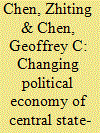

|
|
|
|
|
| Summary/Abstract |
This research seeks to reconceptualise the process of marketizing central state-owned enterprises (CSOEs) in the Chinese petroleum industry by interpreting their institutional establishment and reconstruction, and the change in their institutional context. The enterprise reform of state-owned oil companies, and the partial market liberalization initiated in the 1980s, have not pushed the petroleum sector toward the trajectory of the neoliberal free market. On the contrary, the state’s ascendency has been reconsolidated, and the institutional practice adhered to has made market-shaping possible. The state’s role is not fixed; rather, it has varied following the marketization process of the CSOEs. The state has reconstructed its role to strengthen its authority in the market, using market mechanisms to effectively improve its power to construct a flexible economic governance structure. In such a structure, where the state and market have mutually shaped each other, the combination of the two seemingly conflicting concepts of marketization and economic security has, to some degree, fostered the development of state-owned oil companies and expanded the scale of their asset-holding. The paper contributes to the broader discussion of state-market relationships and the institutionalization of energy governance with regard to China’s integration into the global capitalist economy.
|
|
|
|
|
|
|
|
|
|
|
|
|
|
|
|
| 2 |
ID:
106012
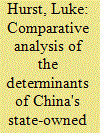

|
|
|
|
|
| Publication |
2011.
|
| Summary/Abstract |
Chinese outward direct investment (ODI) is expanding at an unprecedented rate. The present study augments the understanding of the determinants and drivers of Chinese ODI. It reviews the literature on Chinese ODI and analyzes investment by state-owned enterprises (SOE) for the period 2003-2008, focusing specifically on the differences between the determinants of Chinese investment in developed (OECD) and developing (non-OECD) economies. In addition, the study assesses the appropriateness of the general framework used for investigating ODI determinants (Dunning's eclectic paradigm) to analyze the experience of Chinese SOE. The findings indicate that Dunning's eclectic paradigm provides an excellent theoretical framework for analyzing the determinants of Chinese SOE investment in developed countries, and provides a good starting point for analysis of Chinese investment in developing countries. However, Dunning's specification requires refinement for developing countries. This paper finds a distinct difference between the motivations for Chinese SOE investment in developed and developing countries.
|
|
|
|
|
|
|
|
|
|
|
|
|
|
|
|
| 3 |
ID:
186938
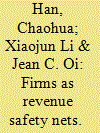

|
|
|
|
|
| Summary/Abstract |
The political connection between the state and firms in the context of China's corporate restructuring has been little explored. Using the clientelist framework and unpacking the incentives of both firms and the state, we analyse political connections as repeated patron–client exchanges where the politically connected firms can help the state fulfil its revenue imperative, serving as a failsafe for local authorities to ensure that upper-level tax quotas are met. Leveraging original surveys of the same Chinese firms over an 11-year period and the variations in their post-restructuring board composition, we find that restructured state-owned enterprises (SOEs) with political connections pay more tax than their assessed amount, independent of profits, in exchange for more preferential access to key inputs and policy opportunities controlled by the state. Examining taxes rather than profits also offers a new interpretation for why China continues to favour its remaining SOEs even when they are less profitable.
|
|
|
|
|
|
|
|
|
|
|
|
|
|
|
|
| 4 |
ID:
137598
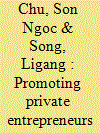

|
|
|
|
|
| Summary/Abstract |
After more than three decades of rapid growth, China's economy is going through an important turning point, where structural imbalances in both supply and demand sides must be addressed for a more moderate and sustainable growth path. By focusing on the structural changes to its ownership, a central element in China's economic transformation under market reform, the present paper highlights the importance of private entrepreneurship in deepening market reform and, thereby, in driving economic growth in a more efficient and sustainable way. Based on a perspective of resource allocation and a conceptual framework of entrepreneurship, the paper elaborates on the evolution of the private sector and its performance in the context of ownership reform, making comparisons with the performance of the state sector. The analysis suggests that there is further room for more productive use of economic resources, especially capital, land and natural resources, by increasing the participation of private entrepreneurs in industries with high entry barriers in favor of state-owned enterprises. Moreover, more competitive and equal access to productive resources through reform is needed to promote more productive entrepreneurship and to reduce rent-seeking activities.
|
|
|
|
|
|
|
|
|
|
|
|
|
|
|
|
| 5 |
ID:
096232
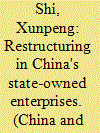

|
|
|
|
|
| Publication |
2010.
|
| Summary/Abstract |
Using firm-level data for China's state-owned coal mines, this paper examines the impact of privatization, corporatization and debt restructuring of state-owned enterprises on technical efficiency. A stochastic frontier production method is applied to a panel dataset from 2000 to 2007. The simultaneous study of these three measures makes it possible to study individual effects more precisely than otherwise. The study shows that the three reform initiatives are all able to improve technical efficiency in state-owned coal mines. The finding of a significant efficiency improvement from relinquishing state ownership provides an alternative to privatization. The study of debt restructuring and technical efficiency has not been documented in the published literature.
|
|
|
|
|
|
|
|
|
|
|
|
|
|
|
|
| 6 |
ID:
106010
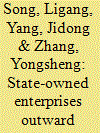

|
|
|
|
|
| Publication |
2011.
|
| Summary/Abstract |
Since China's accession to the WTO in 2001, China has been on a steep learning curve in terms of engaging in outward direct investment, and state-owned enterprises (SOEs) have played a predominant role in this drive. We argue that investment overseas by SOEs is a double-edged sword as far as its impact on domestic reform is concerned. Investing overseas offers opportunities to deepen structural reform in China, but such investment could also strengthen the monopoly position of some SOEs, which is inconsistent with the objective of domestic reform. Therefore, it is important for China to deepen domestic reform with respect to competition, ownership and regulations, to maximize the benefits from investing overseas. The present paper also discusses how building market-compatible institutions will result in increased innovation. This provides opportunities for Chinese firms to effectively catch up with the advanced technologies to remain competitive in overseas markets.
|
|
|
|
|
|
|
|
|
|
|
|
|
|
|
|
|
|
|
|
|